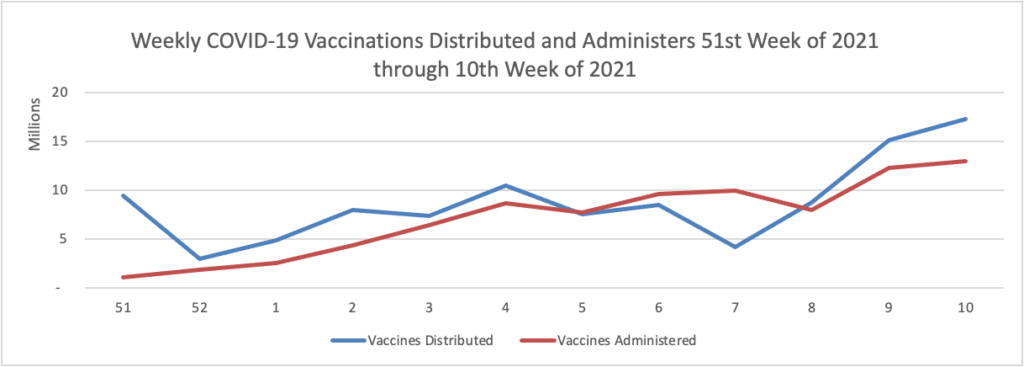Based on the Centers for Disease Control’s COVID-19 Data Tracker website, here is the FEHBlog’s chart of new weekly COVID-19 cases and deaths over the 14th week of 2020 through 10th week of this year (beginning April 2, 2020, and ending March 10, 2021; using Thursday as the first day of the week in order to facilitate this weekly update:

and here is the CDC’s latest overall weekly hospitalization rate chart for COVID-19:

The FEHBlog has noticed that the new cases and deaths chart shows a flat line for new weekly deaths because new cases greatly exceed new deaths. Accordingly here is a chart of new COVID-19 deaths over the period (April 2, 2020, through March 10, 2021):

Finally here is a COVID-19 vaccinations chart over the 51st week of 2020 through the 10th week of 2021 (December 24, 2021 through March 10, 2021) which also uses Thursday as the first day of the week:

As of today, over 100 million COVID-19 vaccinations have been administered in the U.S. and just over one quarter of the eligible U.S. population has received at lease one dose of those vaccinations. And that’s before the supply problem is completed resolved. In that regard, the Department of Health and Human Services today expanded the class of medical professionals who can administer the COVID-19 vaccine.
Fortune Magazine’s editor Alan Murray conversed with Pfizer’s CEO Albert Bourla. Here are the highlights of that interview:
I asked Bourla to reflect on the anniversary. His response:
“I think it is very impressive that a year from a major disaster for humanity, we are emerging with a sense of liberation. To see the Israeli ministry of health with their data so revealing of what a vaccine can do for society—that is the best demonstration of the power of science and the power of human ingenuity.”
If you missed it, the Israeli news is here. What it shows is that the vaccine is highly effective in preventing “symptomatic” as well as “asymptomatic” infections—meaning it is highly unlikely a vaccinated person can be infected or spread infection.
I asked Bourla many of the questions people have been asking me:
Can I travel without risk, now that I’ve been vaccinated?
“Our data demonstrate efficacy from the seventh day. Everybody else demonstrated efficacy from 14 days. You are very reduced risk. Nothing is 100% in biology.”
Can I spread the disease to others?
“The Israeli minister said they saw 94% protection from asymptomatic disease. This is extremely, extremely good news.”
Is there evidence suggesting one of the new variants is not susceptible to the vaccine?
“With everything we see and know right now, we believe the current vaccine is effective against all three variants—South African, Brazilian and U.K. With the U.K., we have clinical evidence.”
Will I have to get a booster?
“I think there is a very high chance that everybody will be getting a booster annually…There are scenarios where you might need one sooner.”
In other COVID-19 news:
- Fierce Healthcare reports that
People who have recovered from a COVID-19 diagnosis face potentially new diagnoses for neurological, behavioral health and cardiovascular conditions, new data from Cigna show. Cigna researchers analyzed (PDF) claims data on 150,000 commercial plan members and their family members between April and June 2020 and found that 5.8% reported neurological conditions post-COVID. In addition, 5.1% reported heart conditions such as heart failure or coronary artery disease, and 5% reported mental health disorders following a COVID-19 diagnosis, the study found.
- The American Medical Association announced that “America’s physicians, pharmacists and nurses are urging their colleagues and other key health care stakeholders to intensify efforts to collect information on race and ethnicity when administering COVID-19 vaccines. “Race and ethnicity data provides critical information to clinicians, health care organizations, public health agencies and policymakers, allowing them to equitably allocate resources across all communities, evaluate health outcomes and improve quality of care and delivery of public health services,” says the open letter, sent by the AMA, American Pharmacists Association (APhA) and the American Nurses Association (ANA).
Agreed but be sure to share the information with health plans too.
